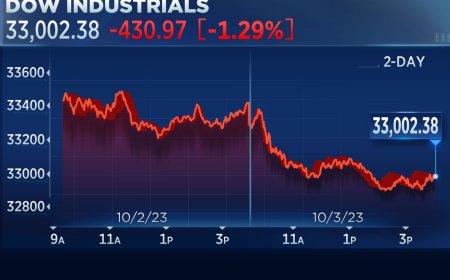RVNL, IRCTC, IRFC: Railway Shares Dropping 33% From Highs – Is It Time to Reevaluate?
Railway stocks like RVNL, IRCTC, and IRFC have dropped by 33% from their peaks. Should investors take this opportunity to reconsider their investments in these railway giants? This article explores the key reasons behind the fall and evaluates if it's the right time to re-enter the market.

RVNL, IRCTC, IRFC: Railway Shares Dropping 33% From Highs – Is It Time to Reevaluate?
The railway sector in India, which has always been a cornerstone of the country’s infrastructure growth, is now facing a significant slump in the stock market. Major railway companies, such as RVNL (Rail Vikas Nigam Limited), IRCTC (Indian Railway Catering and Tourism Corporation), and IRFC (Indian Railway Finance Corporation), have seen their share prices fall by nearly 33% from their recent highs. This sharp decline has left investors wondering: should they reconsider these stocks as part of their investment strategy, or is the drop a sign of deeper challenges within the sector?
In this article, we break down the causes of this price drop, analyze the potential for future growth, and offer insight into whether this could be a good time to re-enter railway stocks.
1. Overview of the Railway Sector’s Stock Market Performance
- Over the past year, railway-related stocks have enjoyed strong performances due to India’s push for infrastructure development.
- RVNL, IRCTC, and IRFC are key players in this sector, with responsibilities ranging from construction projects to ticketing and financing for the Indian Railways.
- However, recently, these stocks have experienced a sharp 33% correction, signaling a mix of market concerns and external factors influencing the sector’s outlook.
2. Factors Behind the 33% Stock Price Decline
- Profit Booking: After a period of strong growth, many investors are choosing to sell and book profits, contributing to the sudden drop in share prices.
- Market Volatility: Global economic uncertainties, changes in interest rates, and inflationary pressures have added to stock market volatility, particularly for infrastructure-based companies.
- Sector-Specific Concerns: Specific challenges within the railway sector, such as project delays, decreased passenger traffic, and financial difficulties, have also played a role in the dip.
3. RVNL (Rail Vikas Nigam Limited): Impact of Project Delays
- RVNL is responsible for large-scale infrastructure projects within the Indian railway network, including electrification, new railway lines, and track modernization.
- Despite its long-term potential, project delays and contract bidding issues have led to reduced investor confidence.
- Additionally, the post-pandemic economic slowdown has put pressure on RVNL’s revenue streams, causing a 33% drop in stock prices.
- However, the government’s continued emphasis on railway development could turn RVNL into a growth story in the near future.
4. IRCTC (Indian Railway Catering and Tourism Corporation): Hit by Reduced Passenger Traffic
- IRCTC is a well-known company, especially for its monopoly on online railway ticket booking, catering services, and tourism packages.
- The decline in IRCTC’s stock price can be largely attributed to the slowdown in domestic tourism and reduced passenger traffic since the pandemic.
- However, with travel restrictions lifting and more people opting for train journeys again, IRCTC has a strong chance of bouncing back. Its diverse revenue streams, including catering and tourism, are expected to see growth in the coming quarters.
- Despite short-term challenges, IRCTC’s long-term fundamentals remain solid due to its unique positioning in the railway ecosystem.
5. IRFC (Indian Railway Finance Corporation): Struggling Amid Market Conditions
- IRFC plays a critical role in funding India’s railway infrastructure projects. However, fluctuating interest rates and concerns about the financial health of railway projects have impacted its stock performance.
- As IRFC funds railway projects, any slowdown or delays in project completion directly affect its revenue growth and profitability.
- Despite these challenges, IRFC remains a crucial player in the railway sector and is likely to benefit from future railway modernization efforts led by the government.
6. Broader Market Sentiment: Why Investors Are Selling
- The stock market’s overall sentiment has shifted due to several factors, including rising concerns about global inflation, interest rate hikes, and geopolitical tensions.
- Investors are also looking at alternative sectors that have shown better growth prospects in recent months, such as technology and consumer goods, pulling their funds out of infrastructure stocks.
- As a result, companies like RVNL, IRCTC, and IRFC, despite being solid, long-term investments, have suffered in the short term due to sector rotation and profit booking.
7. Is It Time to Reconsider Railway Stocks?
- The decline in railway stocks presents a potential buying opportunity for long-term investors.
- With the Indian government continuing to focus on infrastructure development, particularly within the railway sector, stocks like RVNL, IRCTC, and IRFC could see a strong recovery.
- RVNL’s role in major railway projects, IRCTC’s unique monopoly over railway services, and IRFC’s critical role in financing are all positive indicators for future growth.
8. Long-Term Growth Potential for Railway Stocks
- The government’s commitment to modernizing India’s railways is one of the key reasons why railway stocks should remain on the radar of investors.
- The increased focus on infrastructure projects, including high-speed rail, freight corridors, and train station modernization, all point to long-term growth for companies like RVNL and IRFC.
- As domestic tourism and passenger traffic recover, IRCTC is poised to benefit from increased bookings and catering services, making it a strong player for future growth.
- IRFC is likely to play a pivotal role in funding new projects, which will boost its revenues and stock performance in the long run.
9. Risks to Keep in Mind
- Despite their growth potential, railway stocks do come with risks, especially in terms of delays in project execution, rising interest rates, and changes in government policies.
- Investors should closely monitor these risks before making investment decisions, particularly when it comes to infrastructure-based stocks that can be heavily impacted by market conditions.
10. Conclusion: Re-Evaluate, but Don't Overlook
- While RVNL, IRCTC, and IRFC have seen a significant drop in their stock prices, it doesn’t mean these stocks should be written off.
- For investors with a long-term outlook, now could be the right time to accumulate shares at lower prices, keeping in mind the strong fundamentals of the companies and the government’s focus on infrastructure growth.
- However, caution is necessary. Investors should be aware of the short-term risks while keeping an eye on sector-specific developments that could signal a rebound.
In conclusion, while railway stocks are currently trading 33% below their highs, they still hold substantial long-term growth potential. Careful analysis and a focus on the bigger picture may turn these short-term declines into long-term gains for patient investors.
What's Your Reaction?





















































